Nothing Found
Sorry, no posts matched your criteria
Sorry, no posts matched your criteria
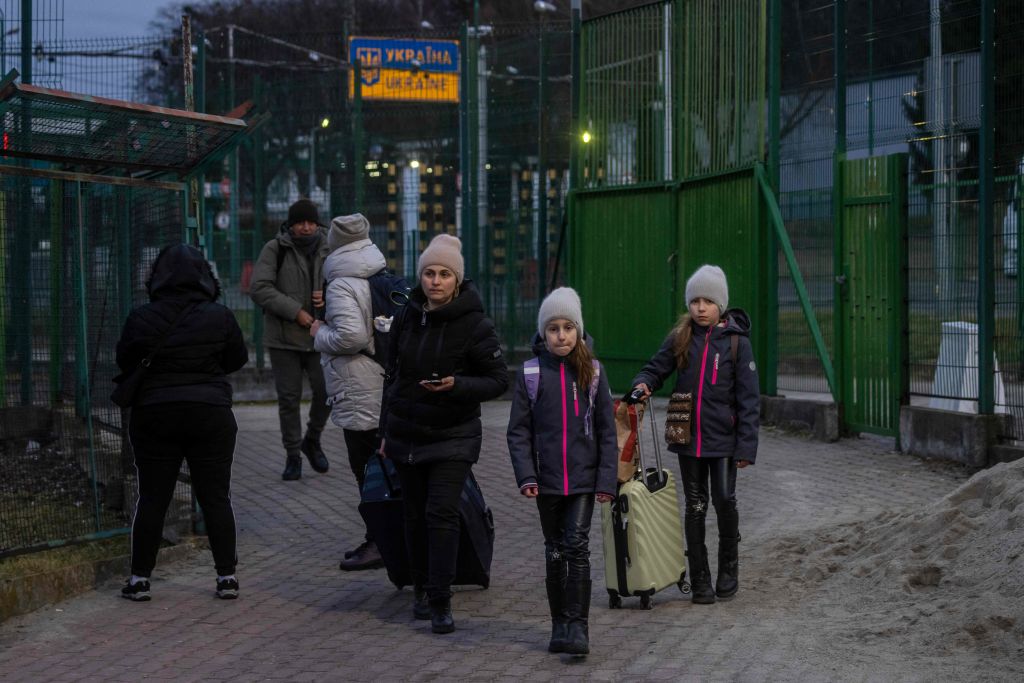
The horrific Russian attack on Ukraine should be a wake-up call for the elites of NATO’s Central European members and the rest of the alliance. Without excusing Russia’s aggression, we must admit that decades of political division and institutional decay contributed to the relative weakness of the Ukrainian state—weaknesses that Russian President Vladimir Putin is now ruthlessly exploiting. While helping the victim and punishing the attacker, other countries in the region should also heed the tough lessons of Ukraine’s tragedy.
When Ukraine emerged from the collapsing Soviet Union in the early 1990s, it was among the economically more prosperous post-communist states. Adjusted for purchasing power, its per capita GDP was roughly 20% higher than that of Poland. If that were still true in 2020, and if Ukraine’s population had not decreased by a staggering 15%, the country’s economy (again, in purchasing power terms) would be almost two-thirds the size of Russia’s. A successful, democratic Ukraine with a powerful military arguably could have had a chance of being admitted to NATO during the window of opportunity used by its neighbours from Central Europe and the former Soviet Baltic republics.
Instead, Ukraine’s three decades of independence were marked by economic stagnation, deep internal divisions and repeated flirtation with authoritarianism, punctuated by impressive but turbulent uprisings by pro-Western parts of society. Meanwhile, Central European countries such as Poland, Hungary and Romania forged a broad domestic consensus about their desire to join the democratic West. That bet paid off handsomely: In one generation, Poland’s economy grew nearly threefold.
Unfortunately, since 2010, the former democratic frontrunners have been sliding down a path eerily similar to that which arrested Ukraine’s post-Soviet growth. In Hungary and Poland, authoritarian leaders have methodically eroded democratic institutions with the sole objective of creating insurmountable barriers for opposition parties to challenge them.
While Hungary and Poland do not have the ethnic or religious fault lines faced by Ukraine, the countries’ strongmen—Viktor Orban and Jaroslaw Kaczynski, respectively—have been busy exploiting and deepening the ideological divides between their country’s more progressive urban populations and more conservative rural citizens. Liberal politicians and intellectuals as well as the dwindling number of independent journalists are routinely derided as traitors, foreign agents or even animals.
In place of the pro-Western foreign policy consensus of the post-communist decades, Orban and Kaczynski have ratcheted up anti-Western rhetoric. In Hungary, cities are routinely plastered with billboards warning against malevolent ‘Brussels’ imposing its will on the Hungarian nation. Kaczynski, for his part, routinely weaponises nationalist hysteria aimed at Germany, Poland’s main ally and trading partner. In their contemplative moments, both leaders ruminate about ‘alternatives to liberal democracy’, which often strikingly resemble the system instituted by Putin. At a time when a truly united European Union is essential, both countries are under partial EU sanctions for their rule-of-law violations.
Instead of investing in non-political, professional homeland security, the Polish government has cynically used the military and security services for domestic intrigue. The security forces have suffered numerous purges aimed at weeding out supposed opposition sympathisers. Multiple reports now confirm that the government used Israeli Pegasus software to spy on leading opposition figures. Just a few months ago, Kaczynski committed the country’s military, and hundreds of millions of euros, to a heavy-handed pushback against desperate Middle Eastern refugees deposited at the Polish border by Putin’s ally, Belarusian President Alexander Lukashenko.
The resulting humanitarian crisis, which involved several refugee deaths, elicited the justified outrage of many Poles, weakening the national consensus around yet another critical state institution, the armed forces.
Like Ukraine’s former strongmen, Leonid Kuchma and Viktor Yanukovych, Kaczynski and Orban are creating ‘mafia states’ of dependent businesses, rigging the economy and undermining the prospects of further convergence with the West. And yet the Western response to Poland and Hungary’s democratic backsliding has focused mainly on rule-of-law issues and their influence on the disbursement of the EU’s sizeable development aid.
That response is essential but insufficient. The West’s formal commitment to defend Central Europe through NATO gives it a vital stake in national reconciliation in countries ravaged by polarisation and populism. It is especially important that these countries recover the elite consensus needed for institutional stability in key fields like foreign policy and security.
Concretely, that means pragmatic power-sharing arrangements, such as carefully targeted decentralisation and unity governments during periods of national emergency. Other ideas should be explored and successful practices in other divided countries in precarious geopolitical positions should be consulted.
Deep ideological and identity divisions exploited by regressive populists are, of course, not only a Central European specialty. But what can be a serious problem for rich, established democracies far from the frontlines of Cold War II constitutes no less than an existential threat to Central European countries.
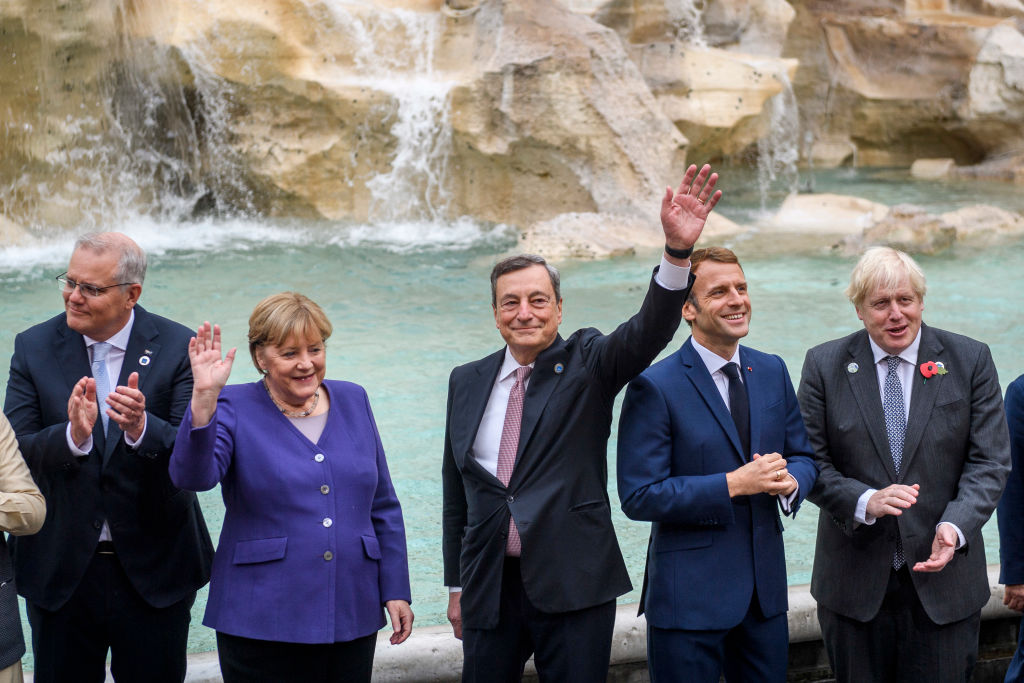
Australia’s freshly drafted free-trade agreement with the United Kingdom is an example of what can be done when two countries decide to put some priority and effort into cooperation. Good results flow. What a shame that a free-trade agreement with the European Union seems harder to attain.
Australia has a Europe problem and Europe has an Australia problem. Failures of trust, attention and priority are at the heart of our difficulties. Key relationships are not being handled well. Our interests demand a better performance.
The change of mind on submarines was always going to test the friendship with Paris, but how it was done, rather than the decision itself, has led to anger. A ‘2+2’ meeting of foreign and defence ministers barely two weeks before the AUKUS bombshell ‘underlined the importance of the Future Submarine program’.
Then we have the prime ministerial photobombing of French President Emmanuel Macron at that Rome reception, as if a quick grin and grip would make the problem go away.
Australia could have taken the American approach. President Joe Biden apologised to Macron for inelegant handling, accepted his share of the blame but didn’t walk backwards on the AUKUS plan. The US secretary of state and vice president went to France on separate trips to make amends.
Foreign Minister Marise Payne this month visited Athens, Brussels, Vienna and London, but not going to Paris is both a decision and a statement. Australia is failing to right the relationship at senior political levels.
We should do so, and soon. Well before an election, the governor-general, foreign minister, a delegation of parliamentarians—anyone senior, really—should seek to be in France discussing the future relationship. The French may not accept a visit, but their grumpiness shouldn’t be the benchmark of our behaviour.
To be clear, Prime Minister Scott Morrison made the only decision to opt for AUKUS and nuclear propulsion. Australia had more than a few reasonable points of concern about progress with the French submarines.
An obvious European problem is the failure of some defence firms to support their Australian customers. Dumping the European Airbus Taipan helicopter in favour of American Black Hawks is the latest instalment of a long-running saga, but the multibillion-dollar decision last Thursday by Qantas to opt for Airbus over Boeing for its domestic aircraft must surely tell Paris that the door is open for industry cooperation.
France remains a friend, a military partner, a consequential Pacific neighbour, an ally against the obnoxious Chinese Communist Party, president of the European Union Council for the first half of 2022, a bulwark of NATO, a permanent member of the UN Security Council and a nuclear power.
Here is one example of the importance of France to Australia: last weekend the people of New Caledonia voted ‘non’ in a third and final referendum to determine if they would ‘accede to full sovereignty and become independent’.
Paris opted to hold the poll a year earlier than planning allowed, presumably to deliver the outcome Macron wanted before his April 2022 re-election bid. The indigenous pro-independence side boycotted the vote. It is unlikely to accept the outcome. This could spiral into violence.
Visiting French Polynesia in July, Macron warned: ‘Woe betide the small, woe betide the isolated, woe betide those who will undergo influence and attacks from hegemonic powers who will come to seek their fish, their technology, their economic resources.’
Macron was referring to China, by far the largest market for New Caledonia’s major exports of nickel and cobalt. Beijing is as active in Noumea as in any Pacific island capital.
Australia doesn’t need another China-dependent, broken-backed microstate emerging to our east, a short flight from Brisbane.
Working together, Canberra and Paris could decide to find new export markets for New Caledonia. We could encourage Australian foreign investment to reduce China’s influence.
Australia needs France as a partner in our region and as an advocate for democratic interests in an increasingly risky world. We cannot afford to have an angry France in the form of Foreign Minister Jean-Yves Le Drian in Jakarta on 24 November talking about the ‘trust crisis’ between Paris and Canberra.
Canberra and Paris have a choice. Echoing the ‘no’ slogan in the Scottish independence referendum, we can be ‘better together’ or ‘bitter together’. Only China wins from the latter approach.
Australia’s Europe problem is broader than France. We have underinvested for decades in building and deepening relationships with like-minded European countries.
Since the 1980s, Australia has been afflicted by a foreign policy mindset that has sought to narrow our interests to Asia with a nod to the US for security.
For Labor governments, there has been an element of ideology attached—that we were turning ourselves away from the reviled Anglosphere and from bloody wars in Europe. Australia would show how independent we were by forging a future in and with Asia.
Julia Gillard’s 2012 Asian century white paper and 2013 national security strategy represented the nadir of this approach. Australia’s economic future would be secured in a ‘relatively benign global landscape’ focusing on Asia, where ties with China, Japan, South Korea, India and Indonesia would drive growth. The rest of the world sunk below the horizons of foreign policy priority.
Coalition governments have been no better. Europe was something to be viewed through London. The Department of Foreign Affairs and Trade was to be starved, a policy blue baby deprived of oxygen. Forays to places like Africa happened only when we were seeking votes to get on the UN Security Council.
When Tony Abbott declared Australia ‘open for business’ on election night in 2013, the business that flooded in was Chinese. There was no interest in or appetite for thinking more broadly about a global approach to Australian foreign policy. As a result, Australia’s relations with European countries are anaemic, underachieving in trade and investment, uninterested in the strategic concerns and opportunities of the region, unreported in the Australian media and skeleton-crewed by officials who are told that the big diplomatic game is Asia.
In 2014, I was asked by Finance Minister Mathias Cormann to be part of the Australia–Germany Advisory Group to help expand the relationship. DFAT’s reaction was barely disguised lack of interest.
Gathered by Cormann in the cabinet room we were told by a languid senior official that Germany was on the ‘outer periphery of Australia’s interests’. At most, our work might take the relationship from the ‘outer edge to the inner edge’ of the periphery.
Germany is a global economic powerhouse, the core of European stability, an industrial innovator, and a big Australian defence industry and scientific partner, but for DFAT a peripheral player.
The combination of an aggressive China and Covid-19 wreaking havoc on global supply chains must surely alert us to the reality that Australia needs Europe. We need its democratic backing when China seeks to punish us with economic coercion.
When French, German, British and Dutch warships sail in the South China Sea to assert freedom of navigation, our reaction should be delight and offers of support, not dismissals of Europe’s lack of relevance to Asia.
Europe is flocking to the Indo-Pacific. Key countries and the EU have produced Indo-Pacific policies and are deepening contact. This presents an opportunity for Australia be a partner of choice.
At present, though, there is a doubt in some European capitals about Australia’s seriousness. DFAT identifies 20 formal bilateral dialogues with European countries as evidence of the opposite, but, having been involved in many, I can tell you these are exercises in bureaucratic capture, managed to deliver modest, unimaginative outcomes.
This is a vital moment for Australia to rethink its approach to Europe because Europe is rethinking its ties with Asia. We should start by developing a plan to expand engagement, driven with ambitious political leadership and hopefully a champion in cabinet to force outcomes.
This will take more effort and money. Let’s close a couple of the five consulates currently not doing business in China. We should expand our presence in European capitals, declaring that we are open for global business.
Along with a strong Quad and AUKUS, a strengthened European strategy spreads Australia’s bets to secure our interests.
Putting more effort into our European ties would signal a new maturity in Australian foreign policy, breaking from past obsessions to narrow the focus to Asia. In reality, this never lifted beyond lazy dependence on China. Australia has global interests that we should pursue with confidence. This will strengthen our position with Asia and persuade European friends that we have value to add in long-term, genuine and respectful partnerships.
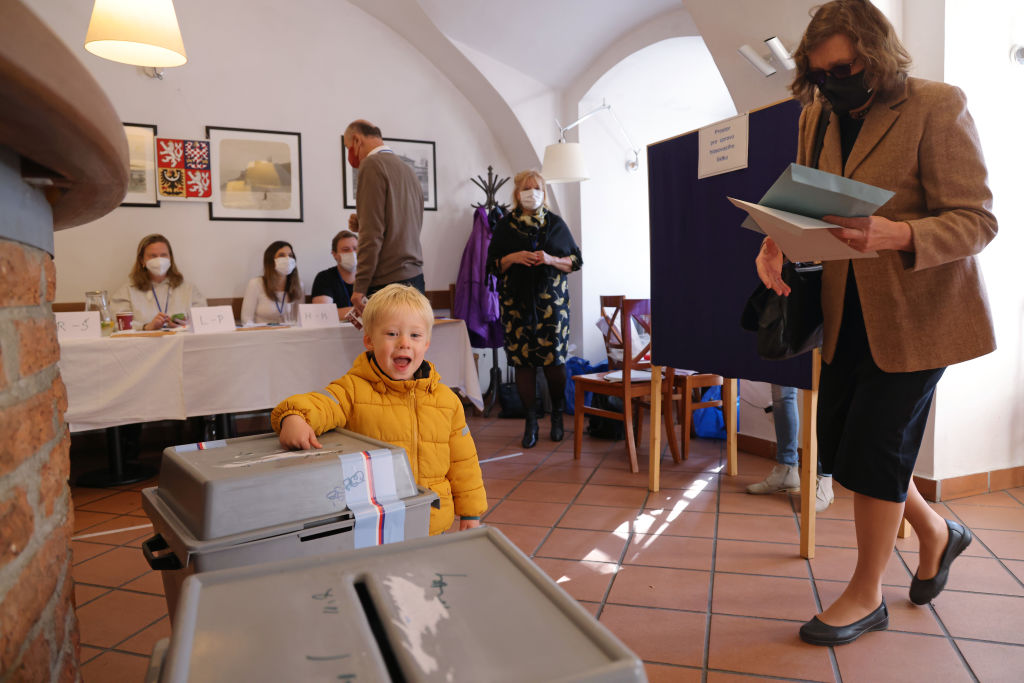
Czech voters delivered an upset in their country’s parliamentary election in October, choosing a coalition of mainly centre-right opposition parties over the movement led by the populist former prime minister, Andrej Babis. With the new coalition naming Petr Fiala as the new prime minister, the outcome adds to a growing playbook of strategies for competing against illiberal populists in Central Europe and Turkey.
During Babis’s tenure as prime minister, he presided over a decline in democracy in the Czech Republic and was embroiled in several corruption scandals. Though Hungarian Prime Minister Viktor Orban and Turkish President Recep Tayyip Erdogan have fuelled more significant democratic declines in their respective countries, Babis relied on some of their methods, including efforts to take over the state administration and undermine the independence of news media.
Anti-democratic leaders learn from one another to refine their approach to dismantling democracy. To defeat them, democratic opposition parties should draw five lessons from recent elections in the Czech Republic and elsewhere.
First, unity is crucial. In the Czech election, the opposition parties that comprise the new government formed two ideologically broad electoral blocs. Hungary, where a fragmented opposition has failed to mount an effective challenge to Orban and his ruling Fidesz party since 2010, has long offered a cautionary counterpoint. But six opposition parties have joined forces in their bid to oust Fidesz in next year’s parliamentary election, and recently nominated provincial mayor Peter Marki-Zay as their candidate to challenge Orban.
A second priority is to address local issues. For example, some analysts attribute Hillary Clinton’s 2016 US presidential election defeat by Donald Trump in part to the Democratic Party’s failure to nurture grassroots support in key states such as Wisconsin.
Contrast that with Warsaw Mayor Rafal Trzaskowski’s unexpectedly strong showing in Poland’s 2020 presidential election. Although Trzaskowski narrowly lost to the incumbent Andrzej Duda of the illiberal ruling Law and Justice (PiS) party, he showed how a supposed ‘urban elite’ politician can connect with rural voters. Trzaskowski campaigned across Poland, including in the PiS’s village and rural strongholds, often with a well-tailored local message. In Skierniewice, a small city in central Poland that had recently been struck by drought, Trzaskowski focused on local water issues, which he linked to his broader climate agenda.
Trzaskowski acknowledged in a 2019 interview that PiS had a stronger ground game in previous elections, and that its ‘Poland in ruins’ message resonated with voters outside major cities who felt that former Prime Minister Donald Tusk’s 2007–2014 Civic Platform (PO) government had not listened to their concerns. In an attempt to win back their support, Trzaskowski distanced himself from some of the PO’s previous unpopular measures and strove to show small-town and rural voters that he was not selling a return to the previous status quo. Although Trzaskowski’s campaign fell narrowly short of victory, it made progress rallying a beleaguered opposition and winning a broader base of voters.
Third, anti-populists should provide an affirmative vision, as opposition candidate Ekrem Imamoglu did in defeating the candidate of Erdogan’s Justice and Development Party (AKP) in the 2019 Istanbul mayoral election. Imamoglu’s positive and upbeat campaign—with its clarion call of ‘radical love’, a direct response to the AKP’s divide-and-rule strategy—was essential to his success.
Another affirmative opposition tactic is to ‘own’ issues. The Greens, for example, used this strategy in the 2019 European Parliament elections to secure a record number of seats. They largely owned environmental, social-justice and rule-of-law issues, and advanced a policy agenda that reflected a positive vision of green leadership in Europe.
Fourth, opposition candidates should avoid culture wars. Populist attitudes are activated by political context: linking identity and partisanship can make cultural issues more salient and create fertile conditions for populist views to flourish. Throughout his 2020 campaign, for example, Duda sought to roll back LGBTQ rights, touted anti-Semitic views and fuelled anti-German feeling in an attempt to stoke populist sentiment.
Importantly, Trzaskowski did not adopt the language of the right. Research shows that when liberal candidates use their populist opponents’ framing, they allow the populist to shape, and likely win, the debate. Likewise, mainstream candidates who mimic populist rhetoric are more likely to lose.
Instead of taking Duda’s bait, Trzaskowski stayed on message with a vision for Poland that could appeal to a wide spectrum of voters. His response even led Duda to modify his nativist agenda in order to court moderate voters. Particularly in rural areas, where Duda had expected cultural issues to be most potent, Trzaskowski’s focus on local concerns helped him avoid divisive culture clashes.
Lastly, democratic opponents of illiberalism need to appeal to fundamental values in order to build public understanding and support. In the recent Czech election, the opposition coalitions referred to themselves primarily as ‘democratic’, reflecting many voters’ concerns that the Babis government had moved the country in a decidedly undemocratic direction.
Similarly, in the 2019 Slovak presidential election, Zuzana Caputova defeated her populist opponents by emphasising inclusivity. When the far-right candidate Marian Kotleba claimed that homosexuality threatened Christian values, Caputova appealed in response to fundamental Christian tenets of compassion and love. In general, a message about defending democracy and basic rights can often be more appealing than a slate of nuts-and-bolts reforms.
The populist surge is far from over. Illiberal incumbents in many countries are scrambling to cement their grips on power, while populist movements elsewhere continue to gain ground. But liberal democratic forces have shown that they can reverse this backwards march. By learning from each other, opposition parties will stand a much better chance of defeating demagogues and safeguarding democracy.
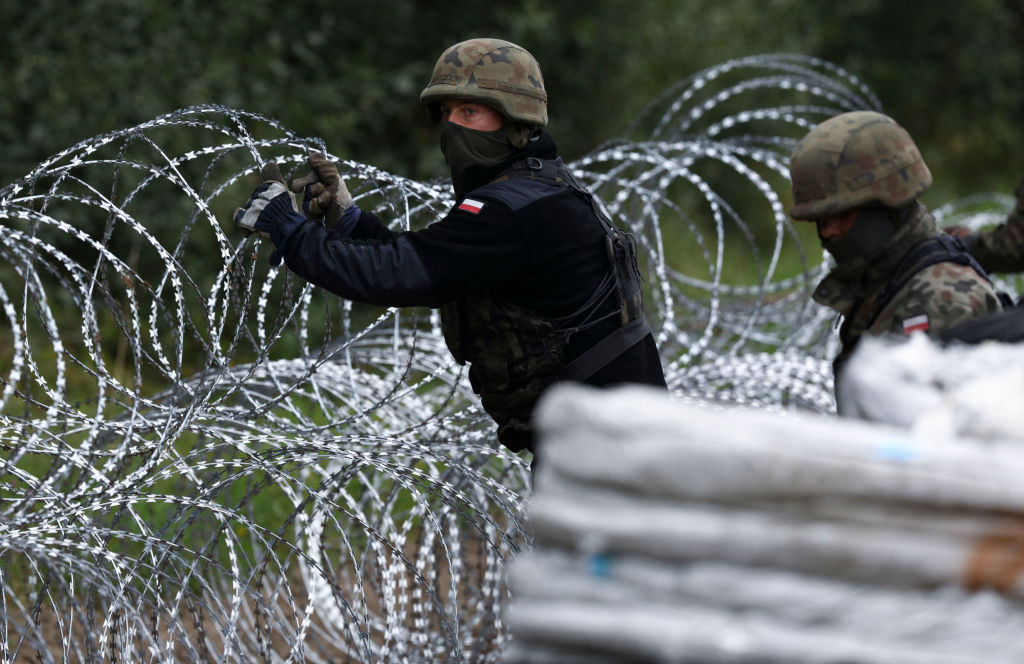
Poland’s ruling Law and Justice (PiS) party knew well what to expect from Belarusian President Alexander Lukashenko before he started funnelling refugees from the Middle East to the Polish border. Belarusian authorities had already done it to Lithuania and Latvia. And in a clear sign of what was to come, Belarus terminated its readmission agreement with the EU in October. Poland had time to pursue preventive measures in the refugees’ countries of origin. It didn’t, and now thousands of desperate people are huddling in the cold on the border, facing options that are either bad or very bad.
One reason why the PiS-led government failed to work with the EU to head off the crisis months ago is that it has been busy fighting EU institutions over its politicisation of Poland’s judiciary, among other issues. The irony, of course, is that PiS had previously gained notoriety for its government’s refusal to take in asylum seekers during the EU-wide refugee crisis of 2015. It should have been obvious at the time that the tables could easily turn—and now they have.
In procrastinating until refugees had already started massing at the border, PiS created an opportunity to stage a cynical show, performatively defending the Polish nation against foreign threats. Officials have since declared a state of emergency and held press conferences against a backdrop of armoured vehicles—moves intended to unite society behind the government by whipping up fear and patriotism. The Polish leadership also refuses to allow journalists into the border area, which leaves the impression that either it has something to hide or is paranoid. Meanwhile, Lukashenko lets reporters in, which helps him promote his version of events.
On the other side of the frontier are Belarusian forces, armed to the teeth and penning in the refugees at the border. Polish and Belarusian soldiers are only a few dozen metres apart, with several thousand desperate people between them. The situation is tense; a shot could be fired at any moment.
Were that to happen, the person in charge on the Belarusian side would be a mad dictator with a propensity for violence. Vivid displays of aggression are already routine for the Belarusian authorities. And, making matters worse, the most experienced military commanders on the Polish side have long since been pushed out by the PiS government.
Lukashenko seems to have concluded that he can best improve his position vis-à-vis the West and his most important ally, Russia, not by demonstrating that he is someone others can work with, but rather by showing that he is capable of anything. After all, his regime has already hijacked a civilian flight traveling between two EU member states just to detain a young journalist onboard. With each provocation, the message to both Russia and the West is clear: ‘If you try to swallow me, I will stick in your throat and choke you.’
The PiS government has left Poland increasingly isolated, having spoiled relations with every ally except the most pro-Russian country in the EU, Viktor Orban’s Hungary. Poland is now a pawn, as can be seen by the decision of German Chancellor Angela Merkel and French President Emmanuel Macron to bypass the Polish government and discuss the migration crisis in calls with Lukashenko and Russian President Vladimir Putin.
Polish citizens now must place all their faith in the remaining goodwill of the EU and NATO. But while Article 5 of the NATO treaty ensures mutual defence against external aggression, it does not specify how allies should respond. Should they send an army or simply create a commission of inquiry? In an age of hybrid warfare, good relations with allies are everything. Poles are safe as long as we are on good terms with Germany, France and the United States. Unfortunately, those relationships are currently in tatters.
The Polish government’s refusal even to ask for international assistance has exacerbated the crisis on the border. Involving Frontex (the EU Border and Coast Guard Agency) would have immediately changed the calculus for Belarus and Russia. An attack on a Polish officer is one thing, but an attack on officers from all EU countries would be quite another. Nor has the Polish government bothered to invoke Article 4 of the NATO Treaty, even though this would trigger an immediate consultation among the allies.
Another reason why Poland was so unprepared for this crisis is that PiS has worked diligently to divide Polish society and the political elite. Desperate to thwart any kind of interparty consensus, the government has not invited the opposition to the country’s National Security Council. But even if it did, opposition politicians would have every reason to suspect that they were being led into a trap. Either way, the focus would remain on jockeying for political advantage, not on building solidarity in the face of a hostile threat.
A united front between PiS, the leading opposition party, Civic Platform, and others would be much easier for political leaders in Berlin, Paris and Washington to support. Civic Platform’s leader, former European Council President Donald Tusk, maintains good relations with Poland’s erstwhile partners and allies. During the last EU summit in Brussels, he held meetings with the most important heads of state and government, whereas Polish Prime Minister Mateusz Morawiecki was mostly shunned.
Standing on their own, Morawiecki and his puppet master, PiS Leader Jaroslaw Kaczynski, are more likely to inspire schadenfreude than sympathy. But this could be a crucial moment for the opposition, which collectively polls better than PiS. Now that Poland is facing a real threat—and not a spectre conjured by Germanophobia or Euroscepticism—world leaders should remember that PiS is not synonymous with Poland.
Poland is still a country worth believing in, even if part of its political elite is doing everything possible to turn it into a basket case. Poland is not only Kaczynski, and the country itself deserves support, even if its government does not.
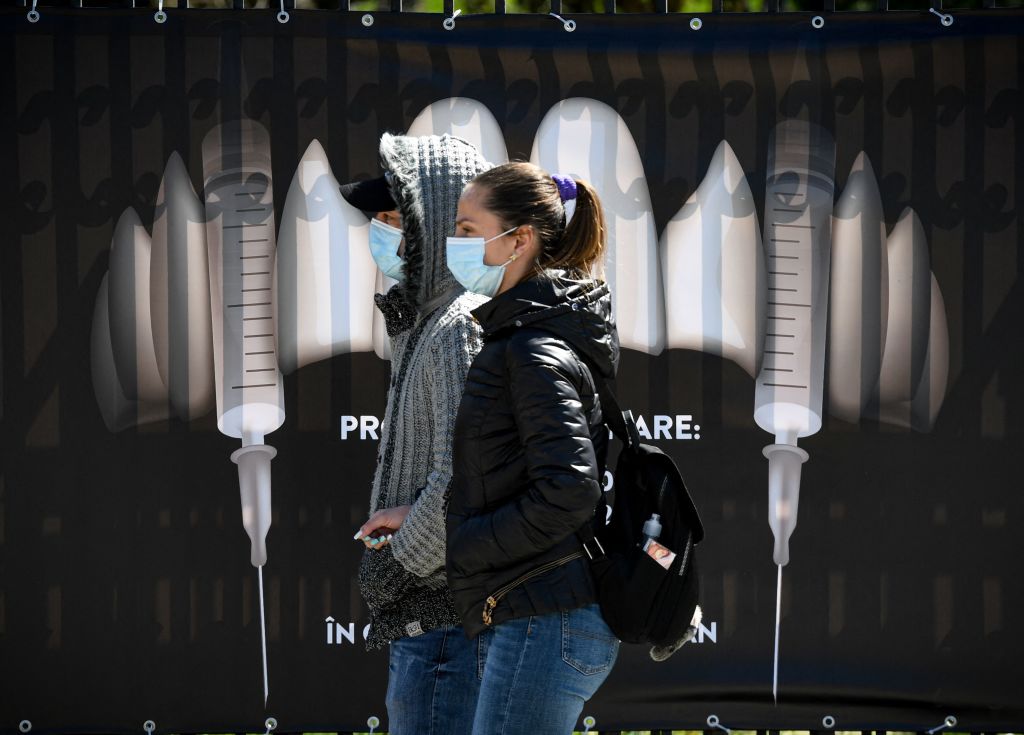
In recent weeks, as Europe has again become the global epicentre of the Covid-19 pandemic, the surge in coronavirus cases, hospitalisations and deaths has highlighted the continued vaccine hesitancy of one group of Europeans in particular: those in the formerly communist east. While 75.6% of European Union citizens are fully vaccinated, the share in Bulgaria is 26.2% and it’s 39.6% in Romania. In countries outside the EU, the numbers are even bleaker. Only 20.2% of Ukraine’s population, and 36.3% of Russia’s, are fully vaccinated.
What is wrong with Eastern Europe? In short, mis- and disinformation. The region is awash in it, a legacy of the breakdown of public trust in governmental institutions after communism. Feverish conspiracy theories have gripped these countries like the coronavirus’s shadow.
A Ukrainian doctor recently summed up the situation in her country: ‘Fake stories have spread widely, making people believe in microchips and genetic mutations … Some Orthodox priests have openly and aggressively urged people not to get vaccinated, and social networks have been filled with the most absurd rumors. Ukrainians have learned to distrust any authorities’ initiatives, and vaccination isn’t an [exception].’
Now, as death rates surpass previous peaks and fear grows, vaccination rates are rising. But in many countries, fake vaccine certificates and PCR test results are widespread—in Bulgaria, for example, vaccine certificates and test results can be bought for €150–300—and no one knows how many of these documents are circulating. Even those who have seen multiple friends die still insist that vaccines are dangerous because they contain nanobots or will rewrite your DNA, or because the global pharmaceutical corporations that produce them can’t be trusted with public safety.
Of course, rumours and misinformation are rife in the West as well. Fox News, the most-watched cable news channel in the United States, has spread vaccine disinformation for years. But 70% of American adults are now fully vaccinated. Why are so many East Europeans more susceptible?
The low level of public trust that distinguishes Eastern Europe is a legacy of the collapse of communism, the deep transitional recessions in many countries, and the failure of post-communist governments to mitigate the effects. While a much-shared Reuters article reports the opinion of unnamed ‘experts’ who blame ‘decades of Communist rule that eroded public trust in state institutions’, public trust was actually much higher under communism.
In the course of writing our recent book, Taking stock of shock: social consequences of the 1989 revolutions, we explored Eastern Europeans’ lack of public trust using data from the World Values Survey and the Life in Transition Survey produced by the European Bank for Reconstruction and Development (EBRD).
With few exceptions, the World Values Survey shows a steady decline in the former communist countries in the percentage of people who agree with the statement, ‘Most people can be trusted.’ The decline was more pronounced in countries that suffered a deeper post-communist recession, and it didn’t reverse when economic growth finally returned. Instead, public trust continued to slide. In Bulgaria, between 1995 and 1998, some of the worst years of the transition recession, 23.7% of respondents had faith in their fellow citizens, compared with only 17.1% in 2017–2020. In Romania, social trust fell from 17.9% to 12.1% in the same period.
Even in the relatively successful cases of Poland and the Czech Republic, for which the World Values Survey has more complete data, trust fell during the post-communist transition. In 1989–1992, 31.3% of Poles and 30.2% of Czechs believed that most people could be trusted. In 2017–2020, that share was significantly lower—just 24.1% and 21.1%, respectively. Revealingly, while social trust declined across Eastern Europe between 1991 and 2007, it increased in Western Europe.
The EBRD launched its massive Life in Transition Survey in 2006 using 1,000 face-to-face interviews in each of the 28 post-communist countries. It found that whereas two-thirds of respondents believed that, before 1989, most people could be trusted, only about a third agreed that most people could be trusted 17 years later. This result was consistent across all regions and countries, with majorities of respondents in all age groups and income categories agreeing that people were generally ‘more trustworthy’ under communism.
Not surprisingly, disappointment with the results of transition also drove down average trust in public institutions (including governments, parliaments, courts, armed forces and police) across the post-communist region from the 1990s through the 2010s. From 1990 to 2013, trust in political institutions in Central and Eastern Europe fell by half.
Reflecting on these data, Erik Berglöf, the EBRD’s chief economist at the time, concluded, ‘It is important to keep in mind that the damage done during the hard times, not only to material well-being but also to general levels of trust and subjective well-being, should not be underestimated.’
In fact, the survey data highlight a little-known fact: the post-communist recessions were the worst in modern history, far worse than the Great Depression. But not all countries suffered equally. While some, particularly the Central European countries, recovered relatively quickly and progressed towards EU norms, many others suffered unimaginable losses. The average post-communist country returned to pre-1989 levels of economic output only after 17 years, nurturing a deep legacy of distrust and a sense of abandonment in countries that, under communism, fostered a culture of mutual assistance against the state.
Eastern Europe’s experience with the pandemic shows that many countries have not yet reversed the profound erosion of public trust that began after 1989. Well before the crisis erupted, these countries had become fertile ground for disinformation campaigns—often of Russian origin—that seek to turn public opinion against the EU, against the West and against successful experts in their own countries. The region’s high degree of vaccine scepticism and surging death rates are a visible result—one that reflects not decades of communist rule, but rather the decades-long social consequences of its collapse.
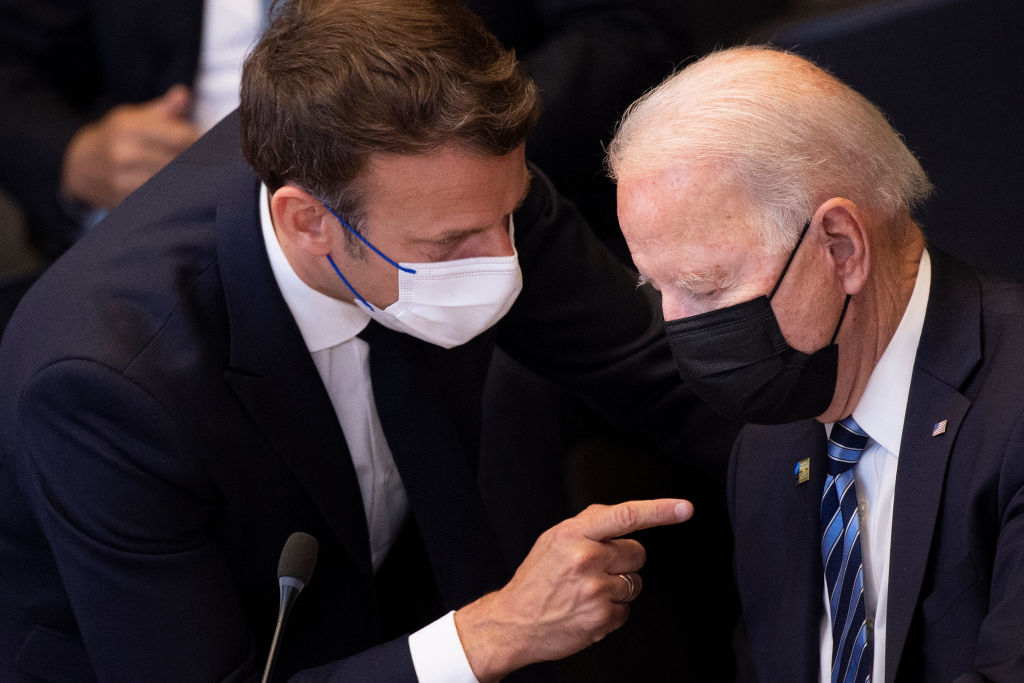
The geopolitical story of the last few years has featured Western democracies’ gradual awakening to the realities of an increasingly ambitious and authoritarian China. European countries have gone from competing with each other to be China’s best friend to sharing the view that China represents a profound, multifaceted challenge.
On global issues such as climate change, European governments must now find a way to work effectively with a difficult partner. On economic and technological issues such as artificial intelligence, China has emerged as a fierce competitor. And on human rights, democracy and the role of the state in the economy, it is now seen as a ‘systemic rival’.
In addition to becoming more realistic about China, Europeans are also becoming more engaged with Asia. France led the pack in 2016 by signing a deal to provide Australia with its diesel-powered [Shortfin] Barracuda submarines, and by inspiring the rest of Europe to develop a new strategy for the Indo-Pacific. Its position on China in recent years has been light years away from that of British Prime Minister Tony Blair, French President Jacques Chirac and German Chancellor Gerhard Schröder, who supported ending a European Union embargo on arms sales to China and granting that country ‘market economy’ status.
But now France has been shoved aside by AUKUS, a new security and technology alliance between the United States, Australia and the United Kingdom. In Washington and London, this deal to provide Australia with nuclear submarines is being framed as one of the most significant strategic advances in decades, even though it has infuriated France.
For the US, AUKUS comes hot on the heels of its chaotic withdrawal from Afghanistan, and thus is being held up as evidence that the Biden administration is serious, competent and tough on foreign policy. Furnishing Australia with a nuclear-powered submarine fleet will significantly extend America’s own ability to project power in the Indo-Pacific—hence China’s displeasure at the pact.
AUKUS is also the first and (so far) only expression of ‘Global Britain’, the newly empowered global player that was supposed to arise after Brexit. The deal is being touted as proof that the UK’s ‘special relationship’ with the US is robust. Even the French could benefit from the new arrangement. By pointing to yet another example of American flakiness, France can bolster its own case for pursuing European strategic autonomy.
Since news of the deal broke, there have been attempts to lower the temperature between Western powers. US President Joe Biden has called French President Emmanuel Macron, admitted that the ‘situation would have benefited from open consultations among allies’, and promised more US support for France’s counterterrorism campaign in the Sahel.
Now that the French have blown off some steam (by temporarily recalling their ambassadors to the US and Australia), many American foreign-policy observers seem to think there will be a return to business as usual. Yet whatever tactical advances the US, UK and Australia may have made, the strategic gains to be had from AUKUS are dubious at best.
Yes, the Indo-Pacific is central to America’s competition with China, and a well-equipped Australia can enhance US naval control over that theatre. But there are other, more important battlegrounds to consider. As we have seen, the China challenge is also about the regulation of AI, global finance, and green technologies and infrastructure. On these issues, the EU has far more to contribute than Australia or the UK does.
It’s in America’s own long-term interest that the EU become more of a sovereign power capable of participating in the defence of shared Western values and interests. By humiliating France, the one EU member state that has openly embraced deeper engagement in the Indo-Pacific, the Biden administration has made this outcome less likely.
And the UK has been no less myopic. Having left the EU, it is struggling to develop relationships with other countries that have less in common with it than its immediate European neighbours do. Even a committed Brexiteer would have trouble arguing that Australia is more important to British military and trade interests than France or other continental Europeans. It’s not Australia that can help the UK by providing emergency truck drivers or stemming the flow of migrants across the English Channel.
But the French are not blameless. Most other EU members see France’s foreign-policy agenda as ultimately anti-American, so the best way to bring them along would be to convince them otherwise. Reducing Europe’s dependence on the US thus should be framed as a pro-American project that will help both Europe and the US confront the challenges of the 21st century. By precipitating a major transatlantic spat and confirming EU Atlanticists’ suspicion that it harbours anti-American resentment, France has undercut its own goals.
It is not too late to realign the various strategies being pursued by Western powers. France, the UK and the US may have generated headlines with moves that feel tactically savvy and emotionally satisfying. But China may turn out to be the strategic winner. Rather than fighting over submarines, Western democracies should be exploring how their Indo-Pacific strategies might complement one another on other critical fronts such as the digital economy, trade and climate change. Achieving that kind of alignment could provide a foundation for bringing on other major partners such as Japan, South Korea and India.
China’s response to AUKUS implicitly acknowledges this. It has applied to join the Comprehensive and Progressive Agreement for Trans-Pacific Partnership, a major deal that was originally promoted by the Obama administration to contain China’s economic rise. In the decade since its negotiation, the US has lost interest in trade deals and China has been exploiting its retreat from the global stage. China’s cynical move to take America’s place in the CPTPP shows a ruthless pragmaticism that could leave Western approaches—including AUKUS—looking flat-footed.
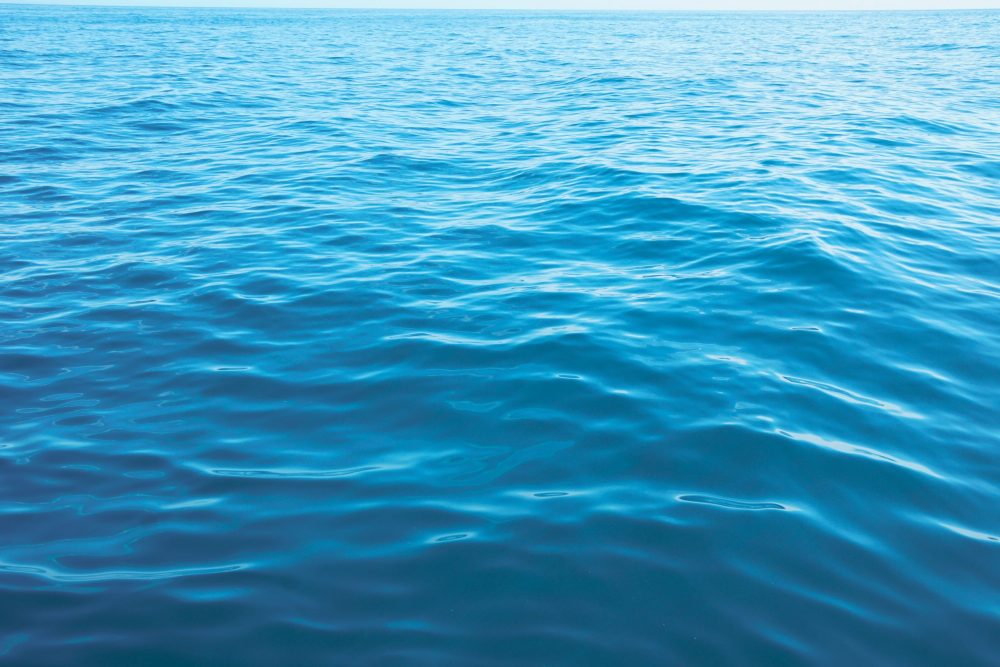
The AUKUS defence and security pact among Australia, the United Kingdom and United States has clearly sunk French, and associated European Union, sentiment towards Indo-Pacific integration. Resurfacing relations won’t be easy, but it should be prioritised to help deliver the optimal 21st-century strategic environment for all concerned.
The arrangement has already produced considerable symbolic fallout. Most notable was France’s decision to recall its Australian and US ambassadors in response to the AUKUS announcement of a nuclear-powered submarine program that spelled the end of French shipbuilder Naval Group’s multibillion-dollar contract with Australia. There are signs that this could lead to tangible setbacks for Europe’s cooperation in the Indo-Pacific. Paris has, for example, looked to frustrate progress on free-trade negotiations between the EU and Australia.
What’s most striking about these events is how they interrupted a years-long trend of intensifying engagement by Paris, Brussels and other continental capitals with the Indo-Pacific as both a region and a geopolitical construct. This interruption should be treated as a serious concern at both ends of the relationship, even if AUKUS might help alternatively bind a non-EU European country, the UK, and a global superpower, the US, to the very same region and construct.
The Indo-Pacific is an area of both vast and increasing opportunities and challenges, most of which are influenced by the continuing rise of China. Responding to regional dynamics is inevitably improved through burden-sharing, particularly when it engages largely like-minded partners and can leverage shared membership of institutional arrangements such as the US alliance system.
The release last week of a key document in this process of engagement, the EU strategy for cooperation in the Indo-Pacific, was largely lost in the wake of the AUKUS announcement. It establishes the bloc’s priorities and intended mechanisms for engaging on critical regional issues. Its priorities include promoting economic development and integration, maintaining regional security, protecting international supply chains, and mitigating and adapting to climate change—all of which have resonance with Indo-Pacific governments to varying degrees.
The EU and its member states are actively pursuing partnerships with Indo-Pacific countries to advance common commercial and strategic interests. Though incipient, their engagement is well founded. France has a direct national interest through several of its overseas territories; 1.5 million of its citizens and most of its large exclusive economic zone are found in the Indo-Pacific. Others, such as Germany, and the EU as a whole, are acting with more generalised but still genuine concern for the health of their deeply connected economies and the international rules-based order.
European–Indo-Pacific partnerships have already advanced past the rhetorical stage. The German frigate Bayern, for example, is currently participating in joint military exercises in the region 20 years after Berlin last had an Asian naval presence. Diplomatic partnerships such as the France–India–Australia trilateral have also been formed. EU–ASEAN ties have advanced through several channels, laying the groundwork for potential game-changers such as a region-to-region free trade agreement.
As a multi-author report from the Perth USAsia Centre and Konrad-Adenauer-Stiftung published this week notes, Indo-Pacific governments have broadly welcomed and sought to deepen these increasing European interests.
Tokyo, for example, has already formed key economic and strategic partnership agreements with Brussels. It is also overcoming challenges with EU military coordination by advancing nation-to-nation security ties with individual member states. Southeast Asian leaders see Europe as able to play an important role in dampening the effect of US–China contestation. Canberra envisages working with Europe on providing neighbouring countries with development and security alternatives to Beijing.
AUKUS will inevitably threaten these promising partnerships so long as the perception persists that the Anglosphere is set to dominate future Indo-Pacific relations. Such perceptions can, however, be managed through the same processes of adroit diplomacy that will be necessary to return Australian, UK and US relations with Europe to the status quo ante of a little over a week ago.
Despite the current contretemps, hopes for a relatively quick rebound are encouraged by two factors in particular. The first is that some key Indo-Pacific countries, including Japan and India, with which European countries have also formed important regional relationships, have already welcomed AUKUS to some degree. This is because the arrangement aligns with the very same goals of engaging more partners in responding to complex regional affairs that have driven continental European ties.
The second encouraging factor is that, as French officials and observers have been quick to note in the past week, motivations for European integration in the Indo-Pacific—and the source of Paris’s opprobrium at the AUKUS announcement—go far beyond the commercial imperative of protecting a single submarine deal, no matter how valuable. They constitute a much deeper and wholly genuine commitment by Europe to help shape the region’s future in ways that can benefit all.
These realities should quickly be recognised and acted on by policymakers in Canberra, London and Washington, as well as Paris, Brussels and other European capitals. If managed correctly, the new AUKUS arrangement could still provide an avenue for encouraging, rather than impeding, the impressive integration of Europe into the Indo-Pacific in the 21st century.
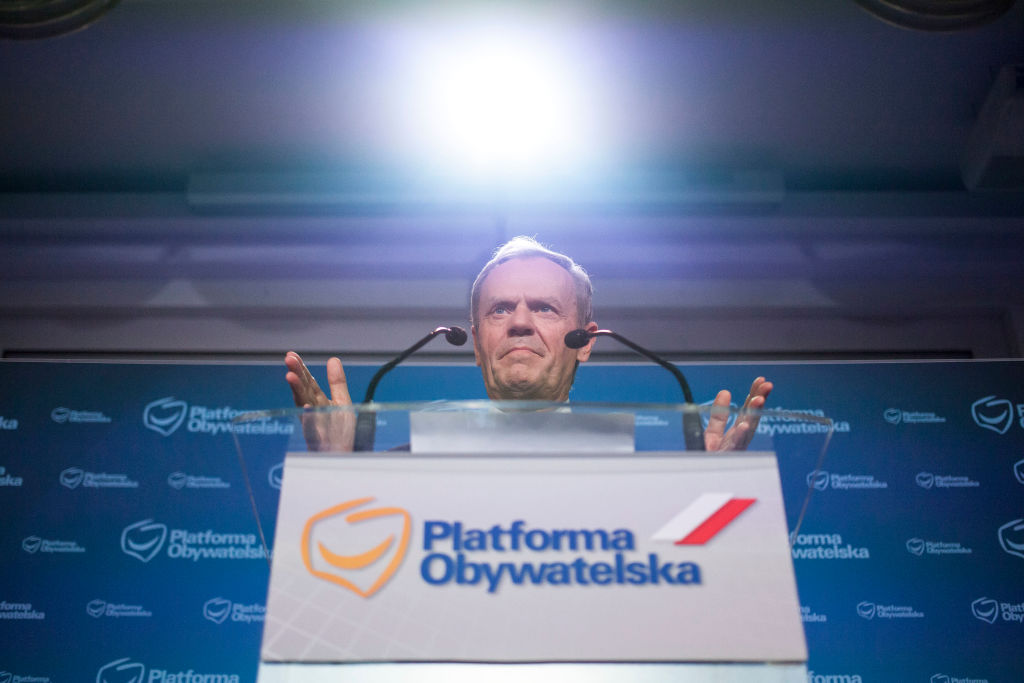
In July, Donald Tusk, the former European Council president who served as Poland’s prime minister from 2007 to 2014, returned to Polish politics. Many voters remember him as the politician who raised the country’s retirement age—a policy that was reversed in 2017 by the Law and Justice Party (PiS). In fact, the PiS has blamed Tusk for pretty much everything that is wrong in Poland.
Other paranoid accusations levelled against Tusk include that he collaborated with Russian President Vladimir Putin in 2010 to arrange the plane crash that killed President Lech Kaczynski, the identical twin brother of PiS leader Jaroslaw Kaczynski, and that he is, in fact, a German backed by Chancellor Angela Merkel.
But Tusk is a consummate pragmatist. He admits that he made some serious mistakes during his tenure as prime minister. He now believes that people should be able to choose whether they want to retire earlier or get a larger pension for retiring later. He is less economically liberal than he was before, conceding that the state should be more active in redistribution. Like the rest of the Polish political class, he acknowledges that the PiS government’s many generous social programs are popular. There will be no returning to the neoliberalism that dominated Poland after 1989, in the era of then–finance minister Leszek Balcerowicz’s ‘shock therapy’.
Tusk’s return has had an electrifying effect. His party, Civic Platform, immediately regained the lead among the opposition, with its support rising from 16.9% to 27.3% in the space of a month. An analysis of the polls shows he has won over as many as one million new voters for the opposition. As one commentator put it, Tusk has rolled in like a tank to challenge the infantrymen of PiS and the other opposition parties.
The atmosphere within Civic Platform has also changed. The party’s previously comatose politicians have woken up. Tusk is travelling the country and meeting activists, local government officials and ordinary people. At press conferences, he answers even hostile questions, including from PiS-aligned media outlets. Not allowing himself to be provoked, he both admits to past mistakes and offers sharp ripostes—a style that contrasts starkly with Kaczynski, who never takes questions at press conferences.
Tusk’s strategy is to serve as a kind of father of the opposition. He not only avoids disputes, but also praises other opposition leaders effusively. He is not the kind of politician who wants to share power; but, for now, he is focused on defeating PiS. That goal comes with significant career risks. Although Kaczynski has a significant resource advantage (presiding over the state budget, public media, state-owned companies and European funds), losing to him nonetheless would be a grave embarrassment for Tusk.
Tusk’s return has also intensified Kaczynski’s war on Poland’s independent media. To limit the opposition’s electoral prospects, PiS has tried to pull the plug on the country’s largest private television station, TVN, and its news channel, TVN24. Because the station is owned by the US company Discovery (which is in the process of merging with another American firm, WarnerMedia, the parent company to CNN), PiS has introduced a law that would bar entities from outside the European Economic Area from controlling television networks operating on the basis of a license issued in Poland.
PiS pretends that it wants to protect Poland’s media market from takeovers by other countries, such as Russia, China or an Arab state. But, giving lie to this claim, the PiS-controlled National Broadcasting Council has been delaying the extension of TVN24’s licence for 18 months, simply out of spite. The station now has less than 50 days to secure a renewal.
Poland is thus spurning the country on which it most depends to maintain its national security. The United States has repeatedly signalled its opposition to PiS’s actions, with a bipartisan group of US senators warning in a recent joint letter that:
These and other steps, which Poland—a NATO ally and close friend and partner of the United States—has recently taken, do not reflect the shared values that underpin our bilateral relationship. Any decision to implement these laws could have negative implications for defense, business, and trade relations. We urge the Polish government to pause before acting on any measure that would impact our longstanding relationship.
The message here is clear. If the law is enacted, Poland can forget about any large weapons contracts, an increased American military presence (beyond the 5,000 US soldiers who currently rotate through the country) or any state visits. Of course, that last point may well suit Kaczynski, who bet everything on Donald Trump remaining in power and now sees no reason to cooperate with US President Joe Biden’s administration.
Still, there is opposition to the so-called ‘Lex TVN‘ even within the ruling camp, where a small group of deputies led by the conservative member of parliament Jaroslaw Gowin has pulled out of the PiS coalition government, opening the possibility of it falling soon.
Kaczynski appears willing to sacrifice the Polish-American alliance in an attempt to obliterate the opposition’s electoral chances. He is even more desperate now that the country’s Covid-19 vaccination campaign has stalled, setting the stage for a fourth pandemic wave and possibly another lockdown. Worse, anti-vaccination sentiment is rising within the right-wing electorate, including among PiS voters. That means the government cannot risk using coercion or discrimination against the unvaccinated to head off more infections.
On top of everything else, Poland is still in a dispute with the European Union over the independence of the judiciary, leaving it vulnerable to having its EU funding cut off. Lacking a stable parliamentary majority and facing the possibility of a fourth wave, PiS thus finds itself on a collision course with not only its own electorate, but also with the EU and the US.
Still, Tusk must pierce the ceiling of 25–30% support to overtake PiS in the polls. The coming months will show us how strong he is, and how weak Kaczynski may have become.
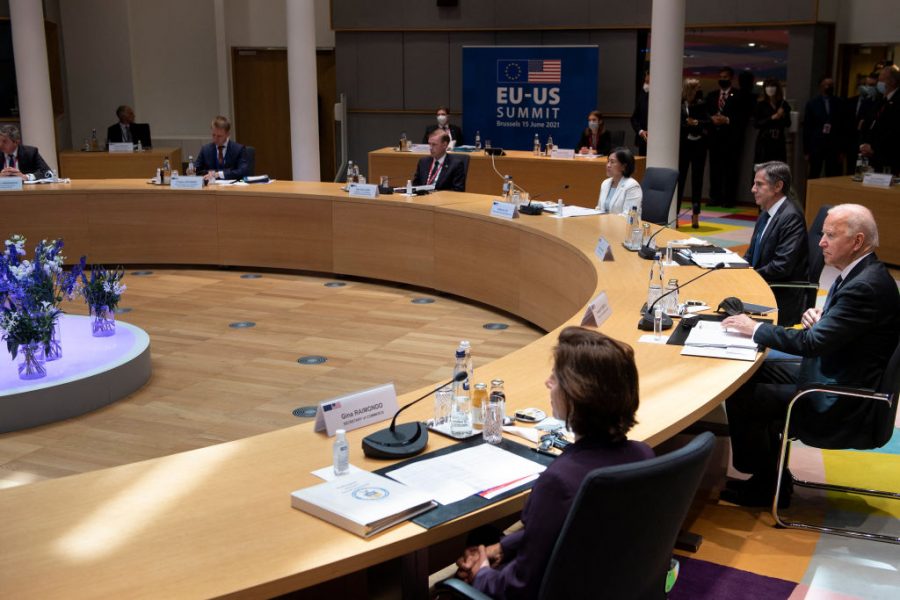
US President Joe Biden has found his mission: to secure the West by strengthening its liberal democracies against authoritarian temptations, both foreign and domestic. Having witnessed both an attempted coup and steeply rising socioeconomic inequalities in his own country, Biden knows that democracies won’t find support abroad until they have fulfilled their promises of fairness, justice and security at home.
If Europe wants to be a partner in this democratic revival, it can start by recognising the realism behind the US administration’s rhetoric. Biden isn’t pining for some mythical lost era of American greatness, as his predecessor did. He is focusing on the future, and he’s concerned with questions that animate democratic liberals and conservatives alike.
For example, how do we create opportunities for those left behind by global capitalism, so that they don’t fall prey to populists’ false promises? How do we restore other developed democratic countries’ commitment to democratic values? How do we rein in overpowered financial and tech industries, or forge a more dynamic global order?
The idea of ‘the West’ was always meant to be universal, offering a normative framework for peaceful, prosperous coexistence among all people. Human rights, freedom of expression, democratic self-determination and the rule of law are not exclusive to any region or group of countries.
But if you are a Chinese leader, you will ask why your country should follow the ‘West’, especially now that most Chinese regard the Western-designed international order as hostile to their own aspirations. From this perspective, the European–American era is over. Signs of Western decadence are ubiquitous—from the Iraq War debacle and the Trump presidency to the United Kingdom’s exit from the European Union.
While Americans and Europeans argue for the importance of individual human rights, the self-confident Chinese rebuttal is that there are also social human rights: to education, nutrition, adequate housing, and so forth. Here, China has undeniably achieved great things, lifting more than 800 million people out of abject poverty over the past four decades.
The lines, then, have been drawn. For Europe to make a meaningful contribution to Biden’s mission, it must become stronger. And because its common foreign and security policy tends to evolve only very slowly, Europe must also continue to press ahead with the expansion of the single market, which will remain Europe’s main attraction and source of strength.
But the single market can retain its attractiveness only if it allows for greater dynamism. To become a technological leader with less dependence on China and the United States, Europe must invest more in research and development, digitalisation and artificial intelligence. It should be pursuing a joint climate policy with the US. And while the G7 recently agreed on a Build Back Better World Partnership to compete with China’s Belt and Road Initiative in Central Asia, Africa and Latin America, the EU must do more to support this program, while also bolstering NATO’s deterrent power.
With federal elections coming in September, Germany, the EU’s biggest economy, should be debating how it intends to strengthen the bloc in the coming years. Yet all the main German parties and politicians have been silent on this issue, presumably because they’re still waiting to see how the pandemic will evolve. Many fear that richer northern member states will regain their economic strength quickly while others—namely, Italy and France—fall further behind.
The EU’s €750 billion recovery fund won’t be enough to achieve anything close to a convergence between southern and northern member states; indeed, it won’t even be enough to prevent them from drifting further apart. Since the EU’s poorer member states are already over-indebted, they can’t borrow much more, particularly if interest rates rise. Whenever inflation begins to increase again, the European Central Bank’s implicit policy of monetising member-state debt (through the unlimited purchase of government bonds from poorer countries) will have to end.
Under these conditions, the only remaining way out would be a ‘transfer union’, with richer countries like Germany increasing their own financial investments in poorer member states. Greater investments in infrastructure, digitalisation and R&D are needed not only to boost efficiency and productivity in the economically weaker member states, but also to hold the eurozone and the EU together. The road is long, however, and longer still because Europe currently lacks the instruments needed to see the journey through.
From the perspective of German fiscal policy, investing in a more economically and socially stable Europe would offer enormous returns. Yes, the prevailing view in Germany is that the country already puts more into Europe than it ‘gets out’. But that is nonsense. As an export champion with a massive, persistent trade surplus, Germany, by definition, receives more than it pays out.
Instead of creating the impression that Germany is dependent on the Chinese export market, German leaders should make clear that the country’s real dependence is on the European market. Germany’s exports to other EU member states account for over 50% of its total exports, whereas China and the US each account for only about 10%.
In the long run, Germany will do only as well as its European neighbours. The sooner we recognise that, the better off we’ll be. Biden’s credo about fixing things at home applies to us, too. We must show that our own democratically constituted societies are better than the autocratic alternatives. Otherwise, the normative idea of the West will continue to lose its lustre.
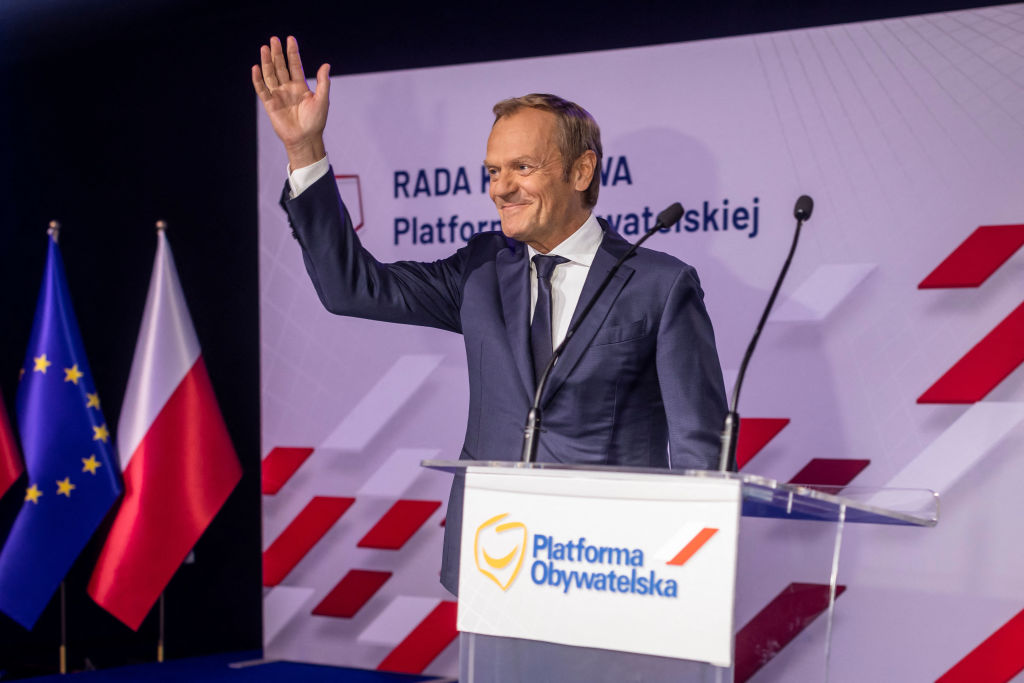
Former Polish Prime Minister Donald Tusk has come back to where he started, reclaiming his position as head of Civic Platform (PO), the party that he led to electoral victories in 2007 and 2011, before going on to serve as president of the European Council. His task now is to return Poland to Europe’s good graces.
With an overwhelming victory over Rafal Trzaskowski, the mayor of Warsaw and Poland’s most popular politician, Tusk has certainly returned with style and aplomb. But his victory has cast a shadow over a younger liberal politician who has been building his own political movement for some time.
It’s hard to believe Trzaskowski’s claim that he doesn’t want to break away and compete with PO (where he will continue to serve as deputy chair). Under its previous chair, Borys Budka, PO suffered a historic loss of support—falling to 15–20% in opinion polls—and has been overtaken by the journalist and activist Szymon Holownia’s Poland 2050 movement (which currently stands at 20–25%).
Budka assumed the position of chair because Trzaskowski originally didn’t want the job. But because Trzaskowski leads the ‘young’ generation that took over the party from Grzegorz Schetyna in January 2020, Budka’s leadership created an untenable division of labor. A party leader who doesn’t represent the most powerful bloc within his party is doomed to failure.
There are generally two career paths open to Polish politicians. If power is what you want most, you must seek to lead your party, engage in local-level politics and become prime minister (or become a puppet master like Jaroslaw Kaczynski, the de facto leader of Poland’s current government). But if you’re more interested in prestige and popularity—and especially if party politics bores you—the presidency is a more suitable aspiration; that office allows one to reign rather than rule.
Tusk (like Kaczynski) is a clear example of the first type, whereas Trzaskowski is more of a ‘presidential’ politician. While Tusk famously sneered that ‘sitting under the [presidential palace] chandelier does not interest me’, Trzaskowski once admitted that he was never so bored as when he became an opposition MP. When he had the chance to lead the party, he dismissed it. After narrowly losing the presidential election last summer, he promised to organise a ‘New Solidarity’ movement, but then failed to follow through on that project.
Now, the political situation has changed. There’s a new movement organised by Trzaskowski, but it’s emerging from the Campus Poland of the Future (a leadership school for 1,000 young people that will be held in Olsztyn this fall). Invitees include well-known intellectuals and the mayors of Prague, Budapest and other cities.
For his part, Trzaskowski wants to rely more on local government officials to mobilise support, capitalising on the fact that the opposition still governs Poland’s 100 largest cities and half its provinces. But, again, no one will be surprised if this strategy fails to lead to the establishment of a new political party.
Trzaskowski and his entourage claim to be preparing for a confrontation with Tusk, but the reality is that their interests are complementary. Because Tusk isn’t interested in the presidency, we can anticipate that he’ll promise to support Trzaskowski in pursuit of that office. Moreover, Trzaskowski surely knows that an open confrontation with Tusk is risky. After all, he still must manage Warsaw on a day-to-day basis, whereas Tusk, whose return dominated Polish media, has plenty of free time to focus on the nuts and bolts of local politicking. The former prime minister has just started a tour of Poland—and has drawn crowds.
For the past year and a half, politics has taken place mainly online, which is why Holownia has managed to gain support in polls despite his lack of party infrastructure. But when normal politics resumes after the pandemic, social media won’t be enough. In this context, it will be important to remember that no successful new party has been formed during the 20 years that Kaczynski’s Law and Justice (PiS) and PO have been the dominant forces in Polish politics.
Nurturing a new party will be just as difficult now as in the past. Since Holownia has done little to show that he can actually lead, Poles won’t know how strong a politician he is until he confronts his first crisis. That may happen soon, as Kaczynski reacts to Tusk’s presence like a bull seeing red. Whatever Holownia’s talents, he will look boyish and callow compared to Tusk.
Yet Tusk’s return is not without risk. Why would a politician who has succeeded in everything now get back into Polish politics to lead a party that has haemorrhaged support? Unlike PO’s, PiS’s position has remained strong—owing to its shameless dishonesty and recourse to populist hand-outs. Poles don’t seem to mind this dirty business. And now that even more EU money from the pandemic recovery fund is poised to flow into the country, the PiS government will have additional resources at its disposal.
The question, then, is whether Tusk can be a credible people’s politician. No other political style can win in a country that has been so deeply infected with populism. If Tusk’s seven years serving at the highest levels of EU power have made him into an incorrigible technocrat, he could go the way of former foreign minister Bronislaw Geremek, a symbol of the Polish intelligentsia who could never win more than 10–12% support in party leadership contests.
Tusk doesn’t need to mimic Kaczynski by openly snubbing elites. But he does need to demonstrate a deep, genuine commitment to working-class and rural Poles. And even that may not be enough to break PiS’s hold on power.